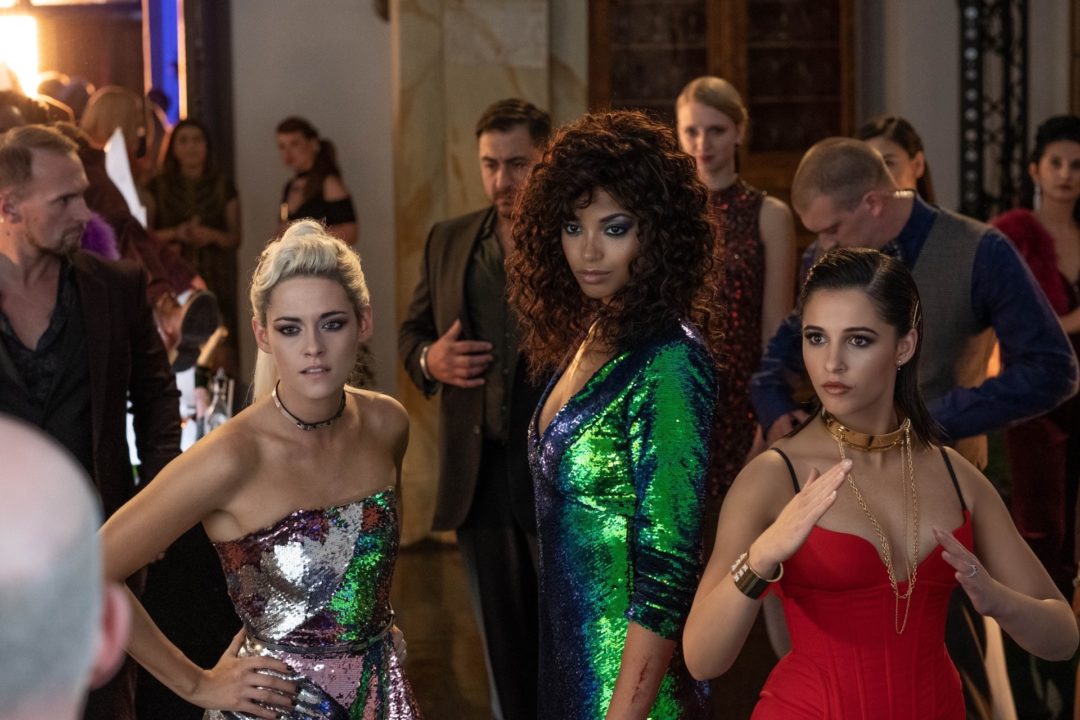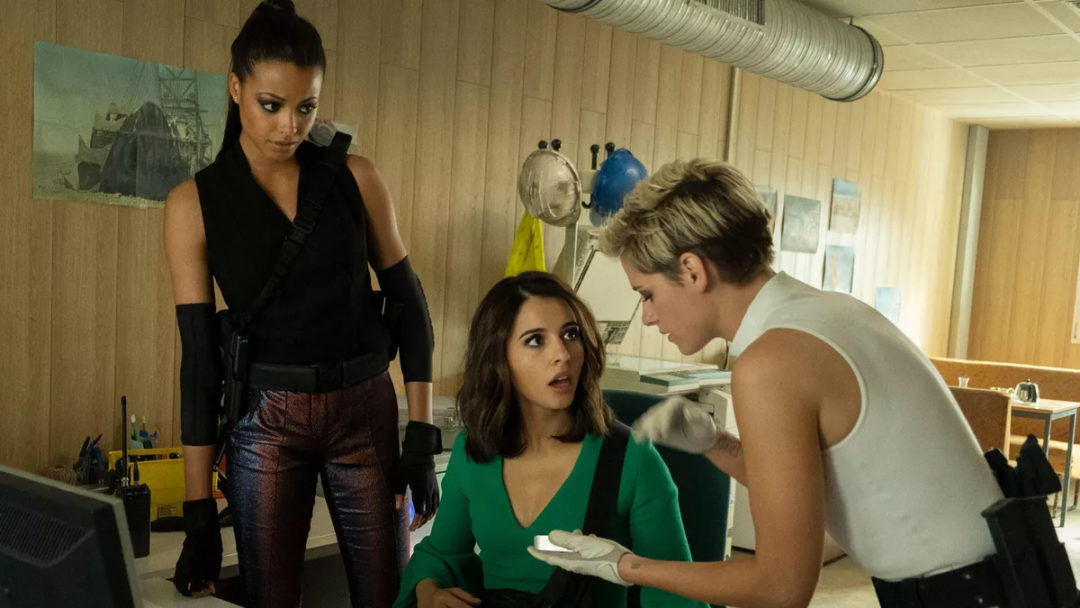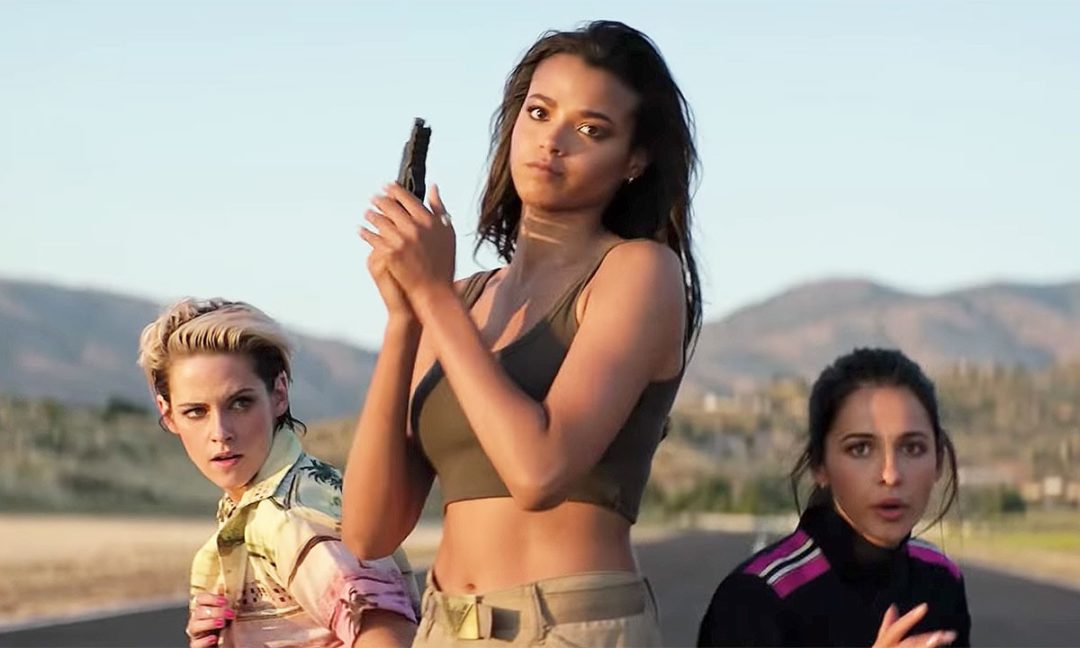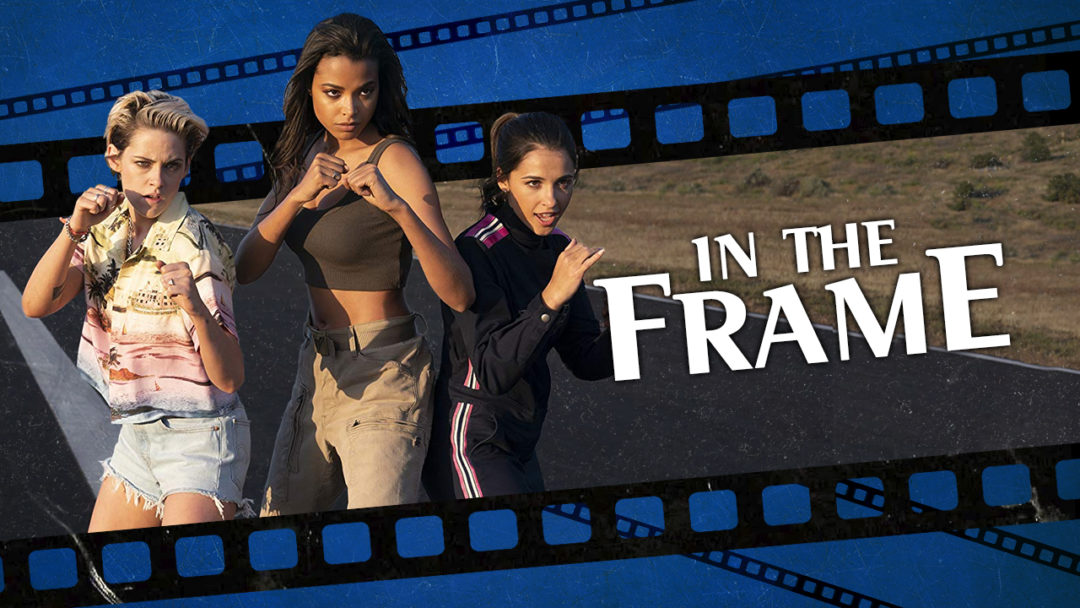This article contains spoilers for Elizabeth Banks’ Charlie’s Angels.
Elizabeth Banks’ Charlie’s Angels is a dysfunctional mess of a blockbuster — one that never seems entirely sure what it wants to be.
Instead, Charlie’s Angels is only certain of what it doesn’t want to be. It defines itself by opposition. The film’s opening sequence is perhaps its most ambitious and most articulate: The camera literally opens within the male gaze. The audience is placed in the perspective of the arms dealer “Australian Jonny” (Chris Pang), gazing longingly across the table at Sabina Wilson (Kristen Stewart).
It’s a moment that evokes the long and complicated history of the Charlie’s Angels franchise, which has been caught between female empowerment and the male gaze. Dating back to the ’70s show, Charlie’s Angels has been the story of women kicking ass and taking names, but primarily while dressed for the pleasure of the presumed male audience: bikinis, hot pants, cat suits.
“I believe that women can do anything,” Sabina boasts, cooing across the table at Australian Jonny. Jonny even jokingly evokes the classic Destiny’s Child soundtrack of the earlier films, calling Sabina “Miss Independent.” What follows is a “seduce the target” sequence that gives way to a more conventional and less gendered action set piece as Sabina strips off her luxuriant blonde wig and a tactical strike force arrives.
However, the problem with Charlie’s Angels is that the film never entirely breaks free from its history. Banks is never quite able to make the film her own. It feels too beholden to what came before, too anchored in the franchise’s history, to ever represent a completely fresh start. From that opening onwards, the film is caught in a tug-of-war that it never resolves. Despite Australian Jonny’s sarcastic remarks, Charlie’s Angels is never independent enough.
At times, Charlie’s Angels pushes towards a more modern action franchise sensibility, darker and more somber than the high camp of earlier installments. At one point, a henchman is fed into a rock grinder in a sequence that evokes the brutality of License to Kill. At another, a henchman ends up impaled on an ice sculpture, complete with a shot of blood trickling down his hand.

These moments might work in a grittier reboot of the franchise, similar to how the James Bond franchise could pivot from the ridiculous excesses of Die Another Day to the grounded thrills of Casino Royale, or how the neon glow of Batman & Robin could surrender to the gritty verisimilitude of Batman Begins. However, Charlie’s Angels is very much not a reboot of the franchise.
Like a lot of modern franchise relaunches, Elizabeth Banks’ Charlie’s Angels tries to have its cake and eat it. It wants to be both a fresh start and a respectful continuation. The business logic is to attract new fans without alienating the established fan base. It is a very cynical and calculated approach, robbing Charlie’s Angels of a clean break.
These days, “hard” reboots are increasingly rare. It is more often to see “stealth” reboots, sequels focusing on new characters that take greats pains to demonstrate their bona fides. When J.J. Abrams relaunched the Star Trek franchise, he cast Leonard Nimoy as a time-traveling Spock to maintain a thread of continuity. Sylvester Stallone remains a supporting player in the Creed franchise.
It speaks to how prevalent the idea of “the canon” has become in modern franchise-building that even a film adaptation of a cheesy ’70s television show feels beholden to the continuity of what came before. Obviously, every adaptation is indebted to what came before, but the key to these projects has always been striking a balance.
Banks establishes quite early on that her film exists in continuity with McG’s earlier franchise films. The original Bosley (Patrick Stewart) is awkwardly inserted into scenes with Alex Munday (Lucy Liu) and Natalie Cook (Cameron Diaz). Later on, Sabina makes reference to a rogue former Angel, likely Madison Lee (Demi Moore) from Full Throttle.

The film even finds Jaclyn Smith reprising her role as Kelly Garrett from the original television series. Although Smith turned up in Full Throttle, McG’s films had the restraint to hold off until the sequel to incorporate her. There is a clear desire to build up this version of Charlie’s Angels as a definitive text for the franchise, indulging in nostalgia for the series’s long history.
This sense of continuity extends beyond mere reference. Charlie’s Angels is overly indebted to what came before in terms of theme and tone. In particular, the film has an urge to indulge the heightened campy aesthetic of the earlier series and films, even when that doesn’t fit with what Banks is doing.
Kristen Stewart is one of the most interesting young actors working today. She was the first American actress to win a César award. Like many actors of her generation, such as Timothée Chalamet and Robert Pattinson, she has a skill for conveying emotional depth and complexity. Stewart is still a divisive figure in certain circles, but like Pattinson, she has paid her dues on the arthouse circuit.
However, despite being the top-billed actor and the strongest performer in the cast, she is assigned the role of goofy comic relief. Sabina is arguably the only lead character without a clear arc. She exists mostly to make goofy jokes and be just a little bit clumsy in life-threatening situations. She is a living embodiment of the franchise’s campy history, and it is a bad fit for Stewart as a performer.
This push-and-pull is responsible for the film’s worst mistakes. Whenever the film threatens to get serious — when the team’s newest recruit grapples with her responsibility for the accidental death of an innocent security guard, or after a party is interrupted with a brutal impalement from the upper balcony — there is always a cheesy one-liner or a sly joke to deflate the weight of the moment.

Charlie’s Angels veers too quickly and too sharply between its extremes, as if Roger Moore had found himself cast in Casino Royale. The movie is goofy and self-aware one minute, but violent and dark the next. It never settles on a single distinctive vision; its desire to offer a fresh reimagining of the established mythos is set against a perverse reverence for that mythos.
Plot decisions feel like false compromises between those extremes. Patrick Stewart plays a traditional version of Bosley, who is soon retired to be replaced by Banks’ more modern version. In the film’s least surprising twist, he turns out to be the villain. “Charlie” sounds like he always has but — in the film’s second-least surprising twist — is revealed to have been a woman all along.
These choices satisfy nobody. They are too tied to the franchise’s past and history to count as a true modernization. They are also such clear breaks with what came before that they don’t really fit within the established framework. It would likely have been easier to just wipe it all and rebuild from the ground up.
In the opening scenes of Charlie’s Angels, Elizabeth Banks offers a mission statement to update the classic concept for the 21st century. The film wants to offer a fresh start and a bold new imagining for the property, but instead it finds itself crushed beneath the weight of expectation. The result is a film that is truly scrambled.





